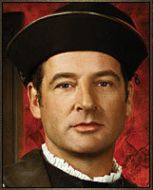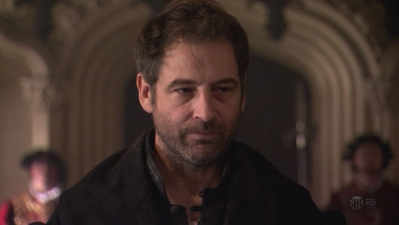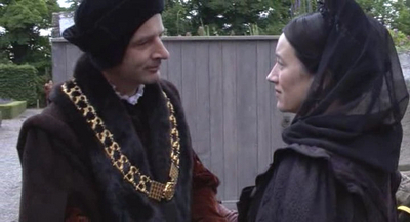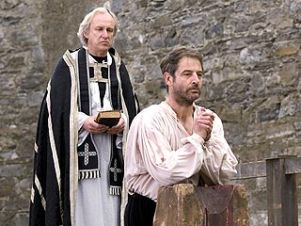Team More Quotes/Favorite Scenes
Jump to navigation
Jump to search
| Favorite Historical Quote |
| Quote: The following is a prayer written by Thomas More while he was a prisoner in the Tower of London awaiting his execution. A Godly Meditation Give me thy Grace, good lord, To set the world at nought, To set my mind fast upon thee. And not to hang upon the blast of men's mouths. To be content to be solitary, Not to long for worldly company, Little and little utterly to cast off the world And rid my mind of all the business thereof. Not to long to hear of worldly things, But that the hearing of worldly phantasies may be to me displeasant. Submitted by: offwithherhead Gladly to be thinking of God, Piteously to call for his help, To learn unto the comfort of God, Busily to labor to love him. To know mine own vility and wretchedness, To humble and meeken myself under the mighty hand of God, To bewail my sins past, For the purging of them, patiently to suffer adversity. Gladly to bear my purgatory here, To be joyful of tribulations, To walk the narrow way that leadeth to life. To bear the cross with Christ, To have the last thing in rememberence, To have ever afore mine eye my death that is ever at hand, To make no stranger to me, To foresee and consider the everlasting fire of hell. To pray for pardon before the judge to come. To have continually in mind the passion that Christ suffered for me, For his benefits uncessantly to give him thanks. To buy the time again that I before have lost. To abstain from vain confabulations, To eschew light foolish mirth and gladness, Recreations not necessary to cut off. Of worldly substance, friends, liberty, life and all, to set the loss at right nought, for the winning of Christ. To think my most enemies my best friends, For the brethren of Joseph could never have done him so much good with their love and favor as they did him with their malice and hatred. These minds are more to be desired of every man, Than all the treasure of all the princes and kings, Christian and heathen, were it gathered and laid together all upon one heap. |
| Quote: This is such a sweet Poem Written in 1510 by More it happens to be my favorite Poem these Days THE TWELVE PROPERTIES OR CONDITIONS OF A LOVER To love one alone and contemn1 all other for that one. To think him unhappy that is not with his love. To adorn himself for the pleasure of his love. To suffer all things, though it were death, to be with his love. To desire also to suffer harm for his love, and to think that hurt sweet. To be with his love ever2 as he may, if not in deed, yet in thought. To love all things that pertaineth unto his love. To covet the praise of his love, and not to suffer any dispraise.3 To believe of his love all things excellent, and to desire that all folk should think the same. To weep often with his love: in presence for joy, in absence for sorrow. To languish4 ever, and ever to burn in the desire of his love. To serve his love, nothing thinking of any reward or profit. The Twelve Properties we have at length more openly Expressed in Balade as it Followetb. The first point is to love but one alone, And for that one all others to forsake: For whoso5 loveth many loveth none:6 The flood that is in many channels take In each of them shall feeble streams make: The love that is divided among many Uneath7 sufficeth that any part have any. So thou that hast thy love set unto God In thy remembrance this imprint8 and grave: As He in sovereign dignity is odd,9 So will He in love no parting fellows10 have: Love Him therefore with all that He thee gave: For body, soul, wit, cunning, mind and thought, Part will He none, but either all or naught. The Second Property. One should love God with his whole being, not just his wit, or cunning. Any partial love of God is inadequate. Of his love, lo, the sight and company To the lover so glad and pleasant is, That whoso hath the grace to come thereby He judgeth him in perfect joy and bliss: And whoso of that company doth miss, Live he in never so prosperous estate,12 He thinketh him wretched and infortunate. So should the lover of God esteem that he Which all the pleasure hath, mirth and disport, That in this world is possible to be, Yet till the time that he may once resort Unto that blessed, joyful, heavenly port Where he of God may have the glorious sight, Is void of perfect joy and sure delight. The Third Property. The third point of a perfect lover is To make him fresh to see that all things been Appointed well and nothing set amiss But all well fashioned, proper, goodly, clean: That in his person, there be nothing seen In speech, apparel, gesture, look or pace That may offend or diminish any grace. So thou that wilt with God get into favor Garnish16 thyself up in as goodly wise As comely be, as honest in behaviour, As it is possible for thee to devise: I mean not hereby that thou shouldest arise And in the glass upon thy body prowl, But with fair virtue to adorn thy soul. The Fourth Property. If love be strong, hot, mighty and fervent, There may no trouble, grief, or sorrow fall, But that the lover would be well content All to endure and think it also too small, Though it were death, so he might therewithal The joyful presence of that person get On whom he hath his heart and love set. Thus should of God the lover be content Any distress or sorrow to endure, Rather than to be from God absent, And glad to die, so that he may be sure By his departing hence for to procure, After this valley dark, the heavenly light, And of his love the glorious blessed sight. The Fifth Property. Not only a lover content is in his heart But coveteth also and longeth to sustain Some labor, incommodity, or smart, Loss, adversity, trouble, grief, or pain: And of his sorrow joyful is and fain, And happy thinketh himself that he may take Some misadventure for his lover's sake. Thus shouldest thou, that lovest God also, In thine heart wish, covet and be glad For Him to suffer trouble, pain and woe: For Whom if thou be never so woe bestead Yet thou ne shalt sustain (be not adread) Half the dolour, grief and adversity That He already suffered hath for thee. The Sixth Property. The perfect lover longeth for to be In presence of his love both night and day, And if it haply so befall that he May not as he would, he will yet as he may Ever be with his love, that is to say, Where his heavy body will not be brought He will be conversant29 in mind and thought. Lo in like manner the lover of God should, At the least in such wise as he may, If he may not in such wise as he would, Be present with God and conversant always; For certes, whoso list,30 he may purvey, Though all the world would him therefrom bereaven To bear his body in earth, his mind in heaven. The Seventh Property. There is no page or servant, most or least, That doth upon his love attend and wait, There is no little worm, no simple beast, Nor none so small a trifle or conceit, Lace, girdle, point, or proper glove strait, But that if to his love it has been near, The lover hath it precious, lief and dear. So every relic, image or picture That doth pertain to God's magnificence, The lover of God should with all busy cure Have it in love, honor and reverence And specially give them pre-eminence Which daily done His blessed body wurche, The quick45 relics, the ministers of His Church. The Eighth Property. A very lover above all earthly things Coveteth and longeth evermore to hear The honour, laud, commendation and praising, And everything that may the fame clear46 Of his love: he may in no manner Endure to hear that therefrom mighten vary Or anything sound into47 the contrary. The lover of God should covet in likewise To hear His honor, worship, laud and praise, Whose sovereign goodness none heart may comprise,48 Whom hell, earth, and all the heaven obeys, Whose perfect lover ought by no manner ways To suffer the cursed words of blasphemy, Or anything spoken of God unreverently. The Ninth Property. A very lover believeth in his mind On whomsoever he hath his heart bent, That in that person men may nothing find But honorable, worthy and excellent, And also surmounting far in his intent All other that he hath known by sight or name: And would that every man should think the same. Of God likewise, so wonderful and high, All things esteem and judge his lover ought, So reverence, worship, honor and magnify, That all the creatures in this world wrought In comparison should he set at nought, And glad be if he might the mean devise That all the world would thinken in likewise. The Tenth Property. The lover is of color dead and pale; There will no sleep into his eyes stalk; He favoureth neither meat, wine, nor ale; He mindeth not what men about him talk; But eat he, drink he, sit, lie down or walk, He burneth ever as it were with a fire In the fervent heat of his desire. Here should the lover of God example take To have Him continually in remembrance, With him in prayer and meditation wake, While others play, revel, sing, and dance: None earthly joy, disport, or vain plesance Should him delight, or anything remove His ardent mind from God, his heavenly love. The Eleventh Property. Diversely passioned is the lover's heart: Now pleasant hope, now dread and grievous fear, Now perfect bliss, now bitter sorrow smart; And whether his love be with him, or elsewhere, Oft from his eyes there falleth many a tear, For very joy, when they together be; When they be sundered, for adversity. Like affections feeleth also the breast Of God's lover in prayer and meditation: When that his love liketh in him rest With inward gladness of pleasant contemplation, Out break the tears for joy and delectation; And when his love list eft to part him fro, Out break the tears again for pain and woe. The Twelfth Property. A very lover will his love obey: His joy it is and all his appetite To pain himself in all that ever he may, That person in whom he set hath his delight Diligently to serve both day and night For very love, without any regard To any profit, guerdon or reward. So thou likewise that hast thine heart set Upward to God, so well thyself endeavor, So studiously that nothing may thee let Not for His service any wise dissever: Freely look also that thou serve thereto, never Trust of reward or profit do thee bind, But only faithful heart and loving mind. * * * * * * * * * * * * * Wageless to serve, three things may us move: First, if the service self be desirable: Second, if they whom that we serve and love Be very good and very, amiable: Thirdly, of reason be we serviceable Without the gaping after any more To such as have done much for us before. Serve God for love, then, not for hope of meed: What service may so desirable be As where all turneth to thine own speed? Who is so good, so lovely also as He Who hath already done so much for thee, As He that first thee made, and on the rood Eft thee redeemèd with His precious blood? Submitted by: ClumsyXheart |
| Quote: *** This is one of my favorites from Utopia "You must not abandon the ship in a storm because you cannot control the winds...What you cannot turn to good, you must at least make as little bad as you can." Submitted by: hrm_elizabeth |
| Quote: His daughter Margaret was telling Thomas about Anne Boleyn and her court and how it was full of dancing and sporting, Mores reply was "Alas, Meg alas, it piteth me to think into what misery, poor soul, she will shortly come... she will spurn our heads of like balls, but it will not be long here her head will dance the like dance". Submitted by: Coronation I found that quote almost eery wasn't it strange how Queen Katherine of Aragon said something simular, almost like they knew what was going to happen to Anne Boleyn |
| Quote:"If my head should win him (Henry) a castle in France I think he'd cut it off" Submitted by:Coronation - Doesn't that just show how well he knew Henry! |
| Quote: Submitted by: |




